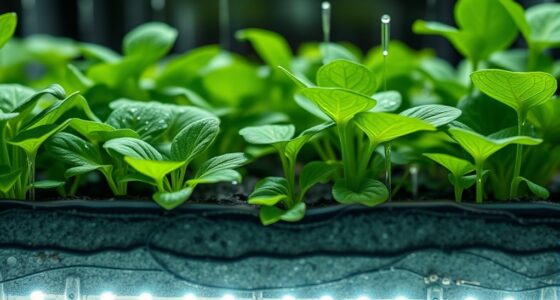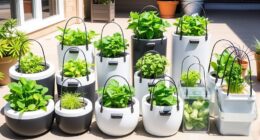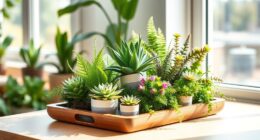Growing herbs indoors offers surprising health benefits, such as providing fresh, chemical-free ingredients that boost your nutrition and flavor. It also helps improve your indoor air quality by filtering pollutants. Plus, caring for herbs reduces stress and encourages mindfulness. With the right light, watering, and care, you create a healthier environment for both your plants and yourself. Keep exploring to discover how indoor gardening can transform your well-being even further.
Key Takeaways
- Fresh herbs grown indoors retain higher nutritional value, boosting overall health and immune support.
- Indoor herb cultivation reduces exposure to pesticides and pollutants found in store-bought herbs.
- Growing herbs indoors encourages mindful eating and healthier cooking habits.
- Indoor herbs can improve indoor air quality by filtering toxins and increasing humidity.
- The act of gardening indoors reduces stress and promotes mental well-being.

Growing herbs indoors is a simple and rewarding way to enjoy fresh flavors year-round. When you bring herbs inside, you gain more control over their environment, ensuring they thrive no matter the season. One of the key factors to successful indoor herb gardening is proper indoor lighting. Most herbs need ample sunlight, ideally six hours or more daily, so placing your pots near south-facing windows is ideal. If natural light is limited, consider investing in grow lights that mimic sunlight, providing the necessary spectrum for healthy growth. This way, your herbs won’t stretch or become leggy, and you’ll enjoy lush, flavorful leaves whenever you need them.
Grow herbs indoors with ample sunlight or grow lights for lush, flavorful leaves year-round.
Indoor lighting isn’t just about promoting growth; it also plays an essential role in pest prevention. When you grow herbs in a controlled indoor environment, you’re less likely to encounter common pests like aphids, spider mites, or whiteflies, which often plague outdoor gardens. By maintaining good lighting and cleanliness, you reduce the risk of pests settling in. Avoid overwatering, which can lead to mold and attract pests, and regularly inspect your plants for any early signs of trouble. Using well-draining pots and sterile soil further minimizes pest and disease problems, keeping your herbs healthy and safe to consume.
Another benefit of growing herbs indoors is that it allows you to maintain a clean and pest-free space, reducing the need for chemical pesticides. Since pests are less likely to invade a well-lit, clean indoor garden, you can enjoy organic herbs without worry. Plus, pest prevention becomes easier when you have easy access to your plants, so you can quickly spot any issues before they escalate. Proper indoor lighting and pest prevention go hand in hand—good lighting encourages healthy, vigorous growth that’s less attractive to pests, making your indoor garden more sustainable and enjoyable.
In addition to pest prevention, having your herbs indoors means you can better monitor their watering and humidity levels, which also impacts pest activity and plant health. Consistent watering and maintaining ideal humidity help keep your herbs resilient against common issues. Incorporating proper watering techniques and controlling humidity are essential components of a successful indoor herb garden. With the right indoor lighting, pest prevention strategies, and attentive care, your herbs will flourish. Not only will you have fresh, flavorful ingredients at your fingertips, but you’ll also be cultivating a healthier, more controlled environment that benefits your overall well-being. Growing herbs indoors isn’t just convenient; it’s a smart way to boost your health and enjoy the many flavors and benefits of fresh herbs all year long.
Frequently Asked Questions
Can Indoor Herbs Reduce Indoor Air Pollution?
Indoor herbs can help improve air quality by reducing pollution levels. As you grow herbs indoors, they absorb carbon dioxide and release oxygen, which enhances air quality. Some herbs, like basil and mint, can also filter out certain airborne toxins, contributing to pollution reduction. By adding herbs to your space, you create a healthier environment, making your home fresher and safer for you and your family.
Are There Herbs That Repel Indoor Pests Naturally?
If you’re looking to keep pests at bay naturally, certain herbs can be your allies through companion planting and herbal repellents. Lavender and basil, for example, repel mosquitoes and flies, while mint and rosemary deter ants and aphids. By incorporating these herbs into your indoor garden, you create a natural pest barrier, boost your plant health, and enjoy a more pest-free living space—all without chemicals.
How Do Indoor Herbs Improve Mental Well-Being?
You can boost your mental well-being by practicing herbal mindfulness with your indoor herbs. Tending to your plants encourages relaxation and helps reduce stress, serving as an effective stress relief technique. The calming presence of fresh herbs creates a soothing environment, promoting focus and emotional balance. By caring for your herbs daily, you engage in a natural form of mindfulness that enhances your overall mental health and sense of tranquility.
Can Growing Herbs Indoors Help With Allergies?
Growing herbs indoors can help with allergy relief by filtering airborne pollen and pollutants, reducing allergy symptoms. Plus, caring for herbs boosts your immune system, making it easier to fight off allergens. Fresh herbs like mint or basil also add natural benefits to your diet, supporting overall health. So, nurturing herbs indoors not only creates a pleasant environment but also provides an immune boost, helping you manage allergies more effectively.
What Are the Best Herbs for Small Apartment Spaces?
Ever wondered which herbs fit perfectly into your small apartment? The secret lies in smart herb selection and space optimization. You should go for compact, easy-to-maintain options like basil, mint, chives, or thyme. These herbs thrive in limited spaces and add fresh flavors to your cooking. By choosing the right herbs and maximizing your space, you create a lush, vibrant indoor garden that surprises everyone with its beauty and practicality.
Conclusion
So, why not turn your space into a lush sanctuary of fresh herbs? As you nurture these green allies, you’ll not only enjoy vibrant flavors and aromas but also reveal surprising health benefits that are right at your fingertips. Like a secret garden waiting to be discovered, growing herbs indoors transforms your home into a haven of wellness and vigor. Embrace this simple act—after all, the roots of good health often start with just a little green.









